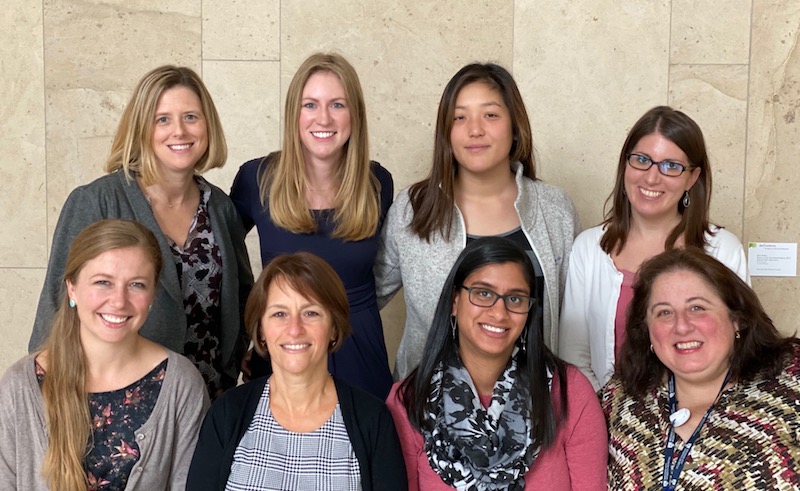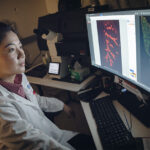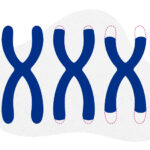Staff spotlight: Meet genetic counselor Beth Rosen Sheidley

In honor of Genetic Counselor Awareness Day, we sat down with Beth Rosen Sheidley, MS, CGC, co-director of the Epilepsy Genetics Program at Boston Children’s Hospital, to learn about the field and practice of genetic counseling.
What is the role of a genetic counselor?
There are about 30 genetic counselors at Boston Children’s across many different departments and specialty areas, including Genetics and Genomics, Cardiology, Laboratory Medicine, and Pulmonology.
In the Department of Neurology, we most often see two types of families: those in search of a diagnosis for their child, and those who have received a new diagnosis and are either seeking a second opinion or a prognosis and treatment plan.
Our role is to help families understand the risks, benefits, and limitations of genetic testing, and to support them through the testing process. Once the testing comes back, we use our training in both human genetics and counseling to translate the results for families, which is why we’re often referred to as “code talkers.”

Historically, genetic counselors have been in patient care roles, but more and more, many of us are moving into roles where we’re using our skills to help with clinical research.
At Boston Children’s, we all are involved in research in some way, whether it’s coordinating gene discovery studies, setting up patient registries or natural history studies, or running clinical trials. For example, there are genetic counselors entirely focused on specific research endeavors, including those conducted by the Manton Center for Orphan Disease Research and Roberts Program.
What do you love most about your job?
When families come in with a known diagnosis, there’s often a lot of basic background they haven’t received yet. We sit down with the family and educate them on what are genes, chromosomes, and DNA, and how everything fits together. We explain how genetic variants arise and help explain why, even without a family history, a child can have a genetic condition.
One of the most rewarding parts of my work is when families come away from one of these visits saying how incredibly helpful and empowering it was.
I also love when we’re able to provide a diagnosis for a family after a very long search. They leave with a condition name, some information to share with friends and family, the knowledge of whether or not it’s likely to affect other family members, and often the name of an advocacy organization they didn’t know existed before. We’ve opened up a whole new world for them.
How has genetic counseling evolved over the last decade?
When I came to Boston Children’s in 2010 to work with Dr. Ann Poduri, there were only a handful of known epilepsy genes and almost no genetic tests to offer. Within three years, there were dramatic advances in genetic testing technology and labs started using next generation sequencing (NGS), which enables rapid sequencing of large numbers of genes. They began offering multi-gene panels with 50, 100, 1,000 genes — and now there’s whole-exome sequencing (WES) where you can sequence all 20,000 genes.
This has been a remarkable time to live through. In some instances, rapid sequencing and discovery leads to a specific genetic diagnosis and more concrete information about prognosis and treatment. On the flip side, we’re learning of so many genetic variants of uncertain significance. There’s just so much we don’t know.
What advice would you give to families in search of a diagnosis?
Every child is different, and what you read online may not be representative. Many families come to us having spent a lot of time reading worst-case scenarios online and are totally freaked out. Don’t do it!
I myself have been in a situation where my own child was very sick and ended up inpatient at Boston Children’s, so I really do understand the temptation to get on your phone. Every day for weeks, while everyone was trying to figure out what was going on, I was Googling … and I was a mess! I’m so fortunate that my colleagues caught wind of this and shut me down, reminding me to let the experts do their jobs.
Learn more about our Epilepsy Genetics Program.
Related Posts :
-

A unique marker for pericytes could help forge a new path for pulmonary hypertension care
Pulmonary arterial hypertension (PAH) is a rare condition that’s difficult to treat. The hallmarks of the disease — narrowing of ...
-

New research paves the way to a better understanding of telomeres
Much the way the caps on the ends of a shoelace prevent it from fraying, telomeres — regions of repetitive DNA ...
-

AI-designed proteins open doors to new immunotherapies
Artificial intelligence (AI) is increasingly helping drive advances in science and medicine — including cellular signaling. In a recent study, published ...
-

Advancing global health: Using AI to detect heart disease in children
In many low- and middle-income countries, pediatric cardiologists can’t help children with congenital heart conditions because of a critical ...





